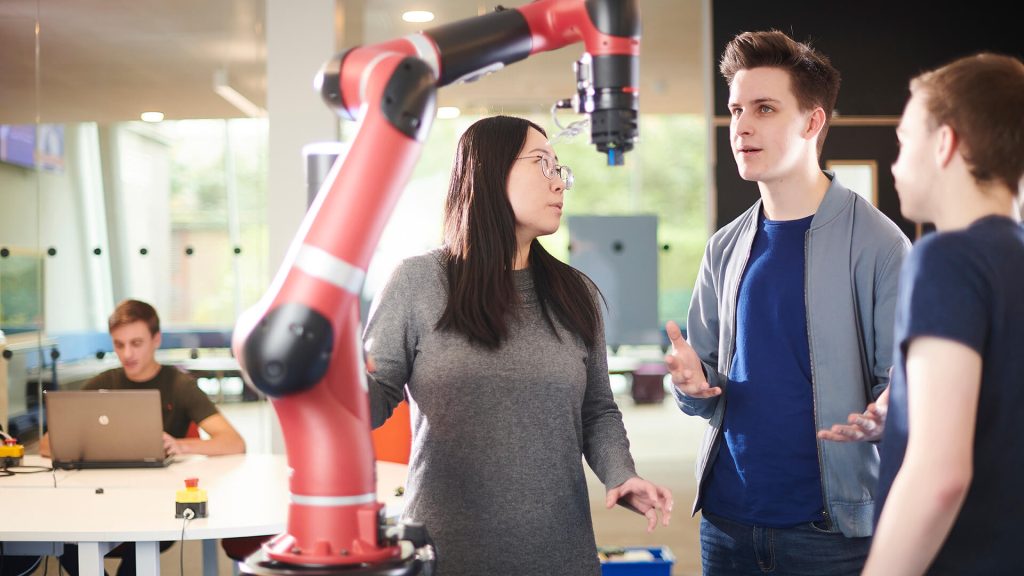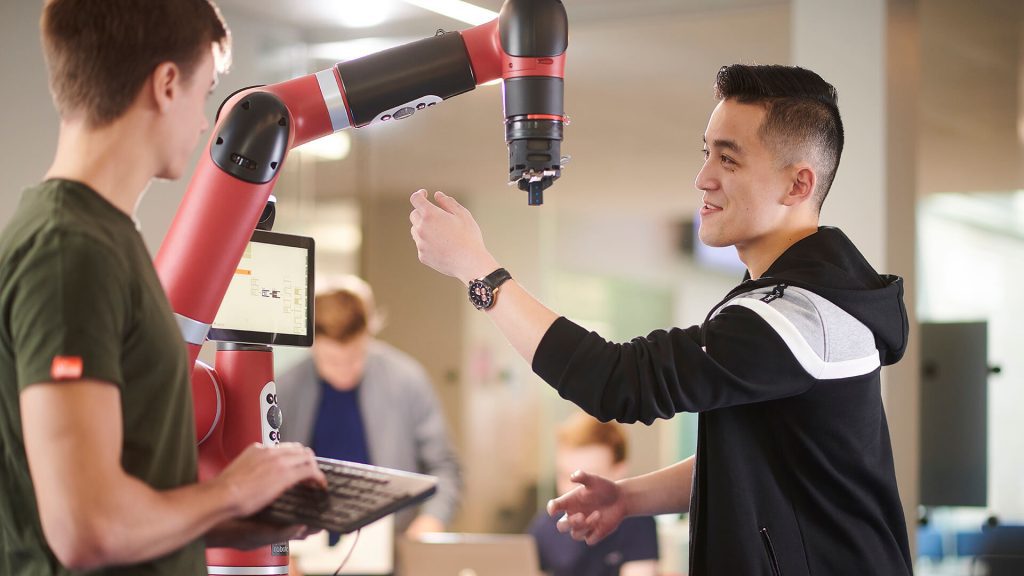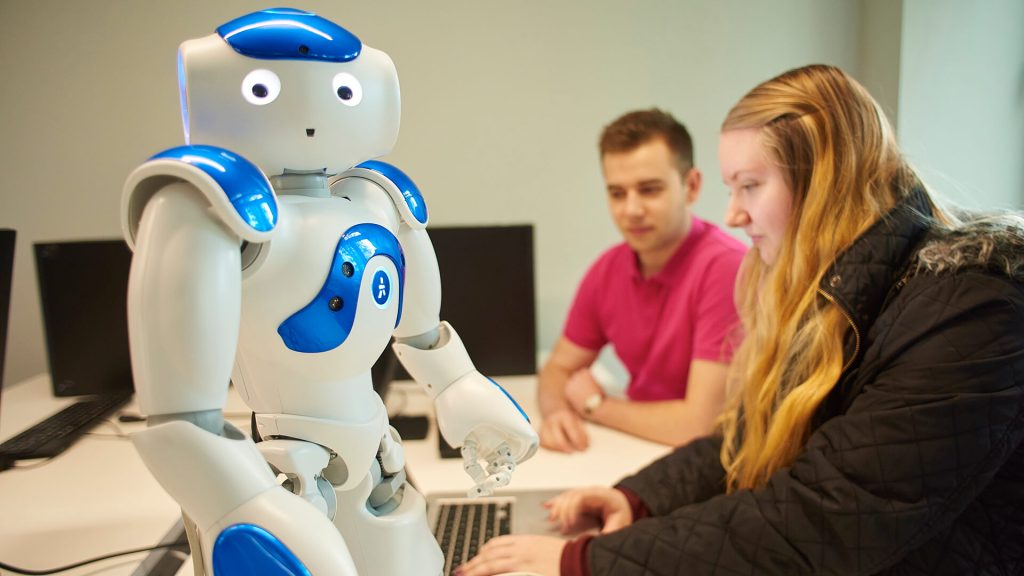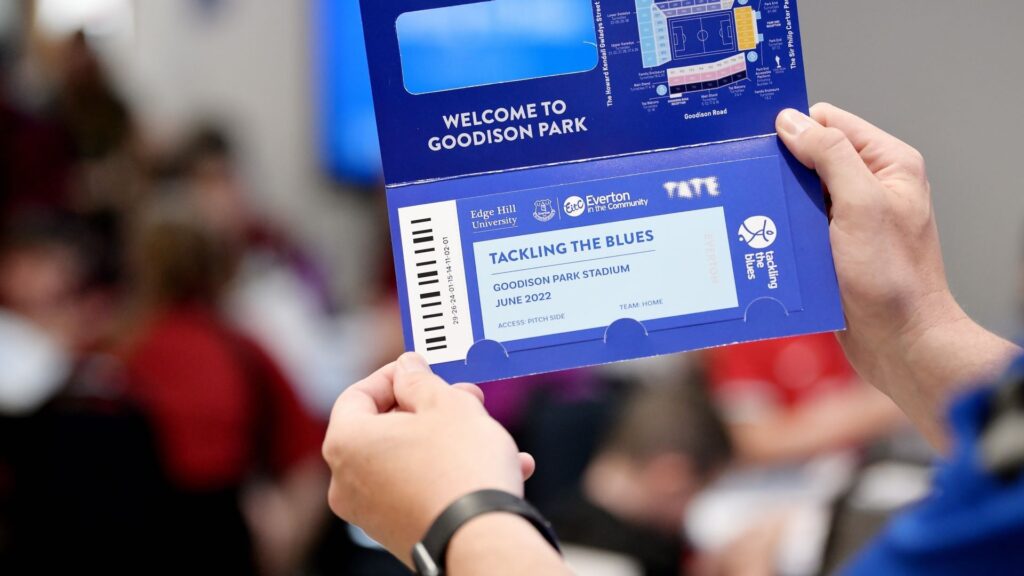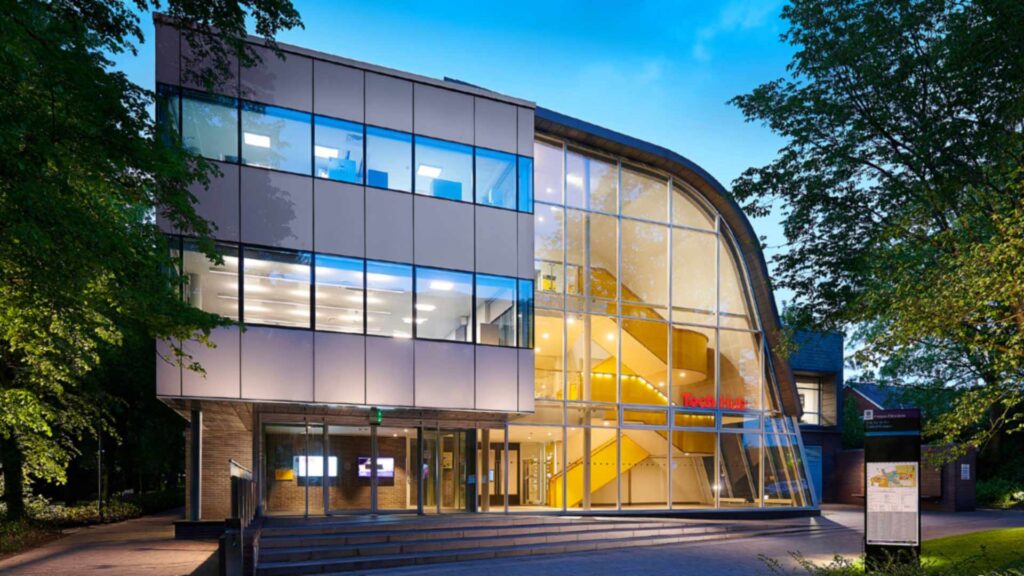Intelligent Automation & Robotics BEng (Hons)
UCAS code: H671
Study intelligent automation and robotics at Edge Hill University and we’ll train you to make an impact in a growing global industry. From manufacturing to autonomous driving, your talents will help shape the future.
Closed to applications.
Overview
| Course length: | 3 years full-time |
|---|---|
| Start dates: | September 2026 |
| Location: | Edge Hill University |
| Subject(s): | Computing, IT and MathematicsEngineering and Physics |
| Faculty: | Arts and Sciences |
| Department: | Engineering |
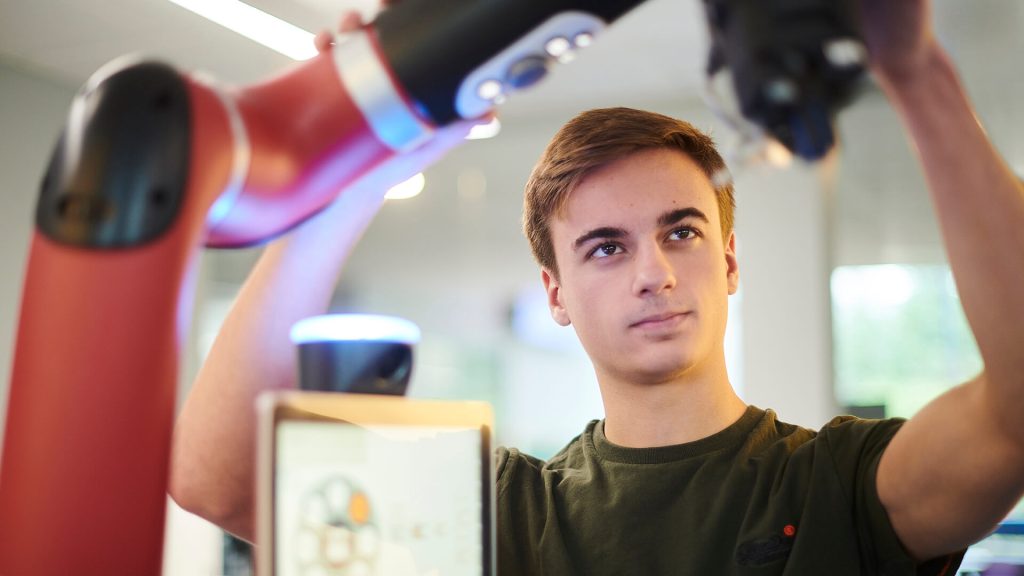
Digital transformation is all around us. From medical engineering to defence technologies, billions of pounds are being spent on improving quality and efficiency.
Our intelligent automation and robotics degree will prepare you for this world. You’ll learn core engineering principles. You’ll manage and participate in design projects. Watch yourself grow in knowledge and expertise.
Throughout the course, you’ll be taught by our team of expert teaching staff. Using a mix of lectures, group discussions, and practical exercises, they’ll guide you through important topics. These will include automation, control instrumentation, software, signal processing, and robotics.
By the end of your degree, you will have developed a variety of important skills that can be applied to different industries. Whatever your goal, we’ll help make it happen.
Course features
-
International students can apply
-
Sandwich year option available
-
Studying abroad option available
-
Work placement opportunity
What you'll study
In your first year, you’ll take a deep dive into a variety of modules. These will cover a range of themes that are essential for understanding key engineering principles. Grasping these will set you up for the rest of your degree. They’ll include digital circuitry and logic, computation and programming, and the mathematical principles that underpin engineering.
You’ll start to specialise in your second year. With your peers, you’ll explore artificial intelligence (AI) techniques. Specifically, how AI influences control behaviour and sense environments in biological systems and robots. You’ll engage in fascinating group exercises, including responding to live briefs to deliver real products. At the end of the year, you’ll have the opportunity to take an optional 12-month industrial placement.
Agent-based modelling. Automated decision-making. Engineering management and enterprise. You’ll delve into these areas of study in your final year. With your advanced knowledge and skills, you’ll also tackle problems around human-robot interaction. Your research and development project will give you the chance to showcase your learning. It’ll set you apart in conversations with future employers.
How you'll study
Teaching methods are designed in consultation with leading employers in the region. Many classes are based in engineering and computing laboratories, focusing on student activity as a means of learning. We introduce theoretical concepts by building on practical activity.
Classes are highly interactive, with the practical application of concepts and cases drawn from real-life being key factors. Workshops, seminars, group tutorials and practical activities provide opportunities for you to work interdependently.
To enhance your employability, you will be given opportunities to work together and develop the essential people skills to complement your technical ability.
How you'll be assessed
You will be assessed through a combination of practical exercises, reports, essays, presentations and examinations. We want you to develop the ability to work effectively, both independently and as part of a team, therefore assessment includes both of these forms, though the emphasis is strongly on individual work.
Who will be teaching you
You will be taught by staff who are passionate about student learning and development. The programme team are specialists in engineering and computing and active researchers in areas including artificial intelligence, machine learning, intelligent systems, mobile computing and distributed systems. Academic staff are regular contributors to conferences and journals, engaging with the wider business and academic environment in disseminating knowledge and delivering impact.
Guest lectures, delivered by industry experts, as well as academics from other disciplines, will broaden your outlook and ensure you benefit from a wide range of knowledge and experience.
Entry criteria
Entry requirements
Typical offer 112-120 UCAS Tariff points. This must include A Level Mathematics at Grade C or above or equivalent. GCSE English Language at Grade C or Grade 4 or above, or equivalent, is also required.
For students studying BTEC a BTEC Extended Diploma in Engineering is preferred. Typical offers will be DMM, with grade Merit or above in one of the following units:
- to solve engineering problems
- engineering mathematics
Example offers
| Qualification | Requirement |
|---|---|
| A Level | BBC-BBB. |
| BTEC Extended Diploma (or combination of BTEC QCF qualifications) | Distinction, Merit, Merit (DMM). |
| T Level | Overall grade of Merit. |
| International Baccalaureate (IB) | We are happy to accept IB qualifications which achieve the required number of UCAS Tariff points. |
| Access to Higher Education Diploma | 45 credits at Level 3, for example 15 credits at Distinction and 30 credits at Merit or 24 credits at Distinction and 21 credits at Merit. The required total can be attained from various credit combinations. |
Please note, the above examples may differ from actual offers made. A combination of A Level and BTEC awards may also be accepted.
If you have a minimum of two A Levels (or equivalent), there is no maximum number of qualifications that we will accept UCAS points from. This includes additional qualifications such as Extended Project Qualification (EPQ), AS Levels that haven't been continued to A Level, and General Studies AS or A Level awards.
English language requirements
International students require IELTS 6.0, with a score no lower than 5.5 in each individual component, or an equivalent English language qualification.
If your current level of English is half a band, one band, or one-and-a-half bands lower, either overall or in one or two elements, you may want to consider our Pre-Sessional English course.
How to apply
Apply full-time
Read our guide to applying through UCAS to find out more about the application process.
Apply part-time
Complete our online application form if you want to study this course on a part-time basis.
International
Please see our international student pages for further information about how to apply as a prospective international student.
This course is currently closed to applications.
Should you accept an offer of a place to study with us and formally enrol as a student, you will be subject to the provisions of the regulations, rules, codes, conditions and policies which apply to our students. These are available at www.edgehill.ac.uk/studentterms.
If you join a full time undergraduate degree at Edge Hill University, we will guarantee you the offer of a room in our halls of residence for the first year of your course.
Discover our accommodation
Facilities
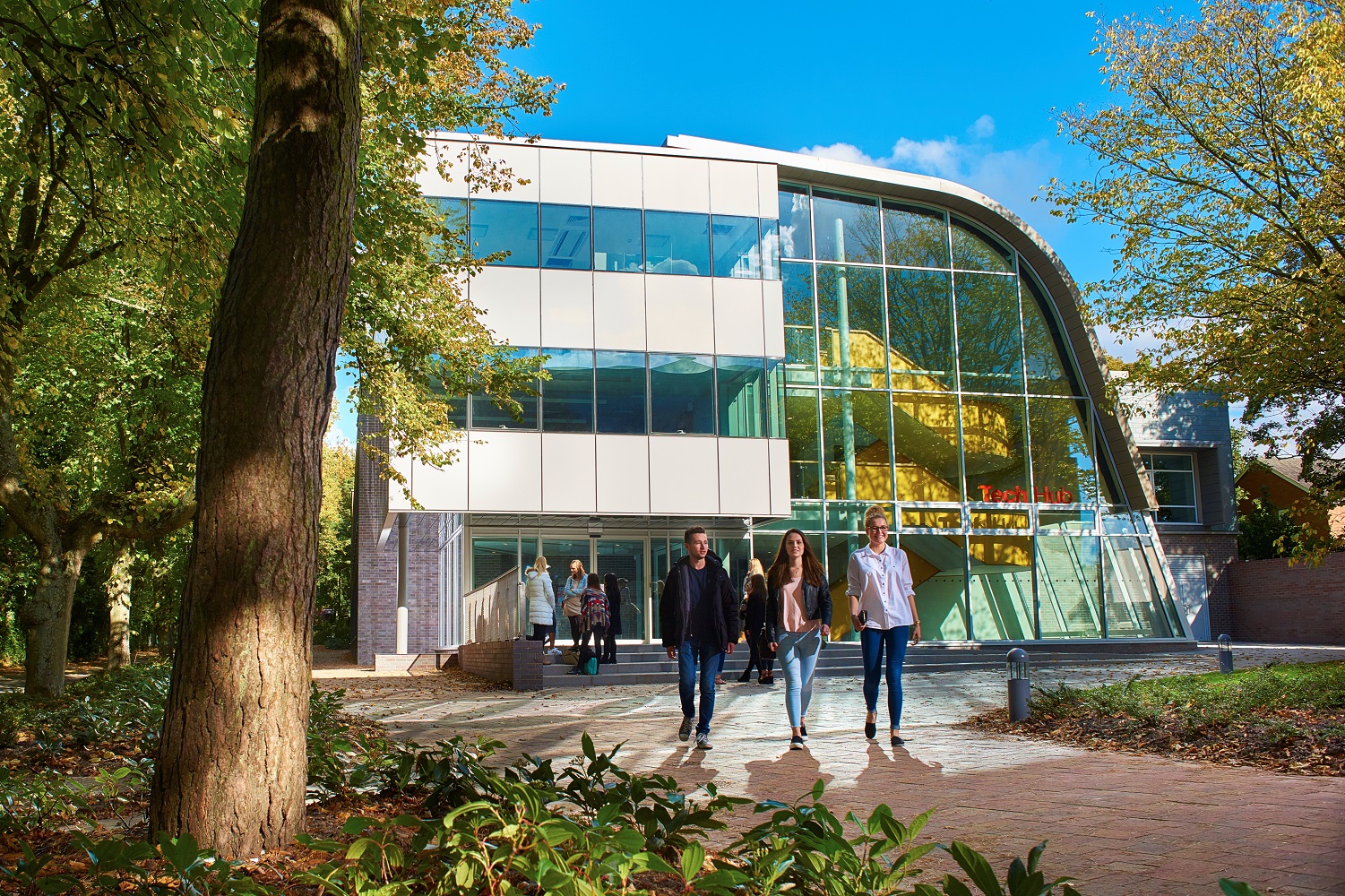
The Department of Engineering is based in the state-of-the-art £13m Tech Hub. This purpose-built development offers highly contemporary suites of outstanding facilities for Engineering and Physics, as well as Computing and IT students. Our modern engineering teaching laboratories are equipped with a range of industry-standard, test and measurement equipment, and leading analytical software.
There are dedicated specialist laboratories for materials engineering, electrical motors, and electronic engineering, in addition to an abundance of computer facilities and a large, horseshoe-shaped Harvard style lecture theatre.
Where you'll study
Tech Hub
Learning resources
Learning resources include oscilloscopes, signal generators, digital multimeters, Arduino and Raspberry Pi microprocessors, a tensile tester machine, electronics training kits, single and 3-phase transformers, a 3-D printer, and robotic arm kits, plus MATLAB and SolidWorks software platforms.
Teaching and learning are supported by the web-based platform Blackboard Ultra Virtual learning Environment. The library is well-stocked with recommended print books and e-books and subscribes to high-impact technical e-Journals. The university subscribes to LinkedIn Learning, which provides free and unlimited access to thousands of high-quality online courses and video tutorials written by industry experts.
Assistive and accessible technologies include Read&Write text to speech software, Caption Ed to facilitate ease of note taking, and a mind mapping tool. The university provides specific workshops on academic skills for students who have specific learning difficulty or disability.
.
Finance
Tuition fees
UK Full-Time
£9,250
a year
UK Part-Time
£77 per credit
for 360 credits
International
£16,500
a year
EU/EEA and Swiss students who have settled or pre-settled status under the EU Settlement Scheme, as well as Irish nationals, may be eligible for the UK tuition fee rate.
Financial support
Subject to eligibility, UK students joining this course can apply for a Tuition Fee Loan from the Government to cover the full cost of tuition fees. UK students enrolling on the course may also be eligible to apply for additional funding to help with living costs.
Please view the relevant Money Matters guide for comprehensive information about the financial support available to eligible UK students.
EU/EEA and Swiss students who have settled or pre-settled status under the EU Settlement Scheme may be eligible to apply for financial support. Irish nationals can ordinarily apply to Student Universal Support Ireland (SUSI). If you are an EU student who does not have settled or pre-settled status, or are an international student from a non-EU country, please see our international student finance pages.
Your future career
From product design to vehicular design, your technical expertise will be highly valued in the workplace. Rapid technological changes mean that you’ll be in-demand across the globe.
As a highly skilled graduate with a BEng Intelligent Automation & Robotics degree, you might work in roles such as:
- Automation Engineer
- Control Engineer
- Electrical Engineer
- Power Engineer
- Product Design Engineer
- Vehicular Design Engineer
Alternatively, you might want to use your skills in other industries.
As an engineer, continuous professional development throughout your career is encouraged. Your employer might support you to access professional bodies such as the Institution of Engineering and Technology (IET). As a graduate engineer, you’ll keep abreast of industry developments through engaging with things like short courses, conferences, and workshops.
Course changes
Every effort has been made to ensure the accuracy of this information, however our courses are subject to ongoing review and development. Changing circumstances may necessitate alteration to, or the cancellation of, courses.
Changes may be necessary to comply with the requirements of professional bodies, revisions to subject benchmarks statements, to keep courses updated and contemporary, or as a result of student feedback. We reserve the right to make variations if we consider such action to be necessary or in the best interests of students.

